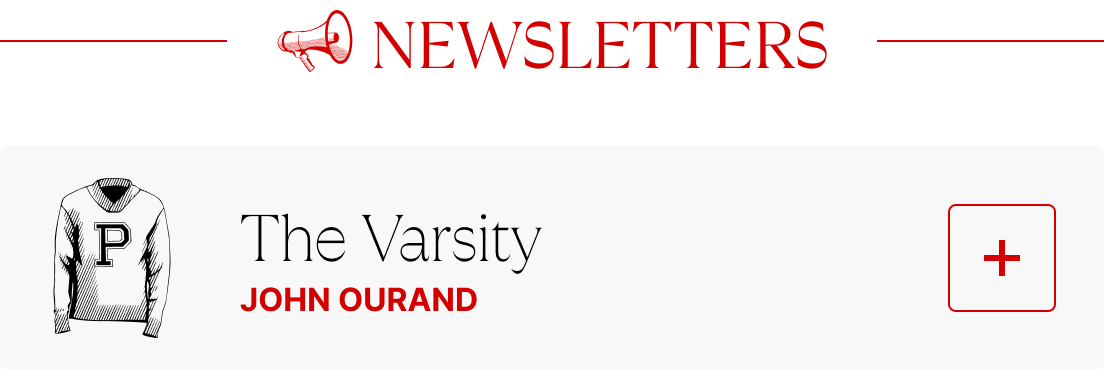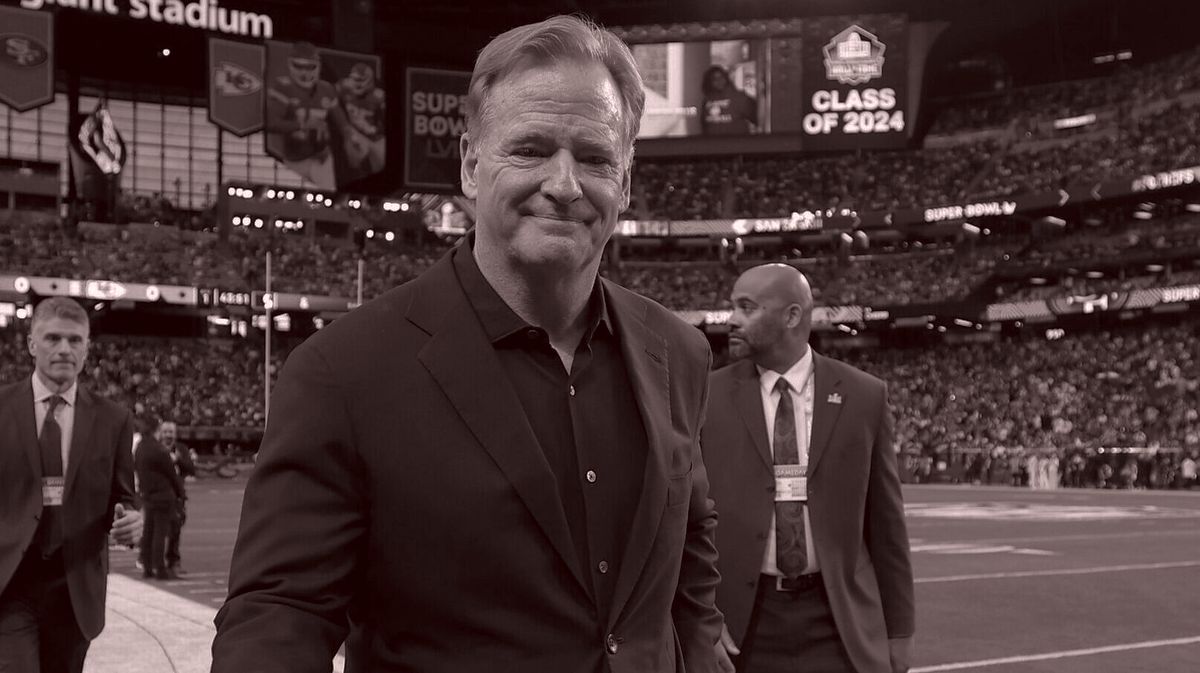Greetings from Los Angeles, welcome back to In the Room, and
happy Super Bowl weekend. If you’re in New Orleans, say hi to my man Ourand and buy him a Sazerac for me. I couldn’t make it to the Big Easy this year, but maybe I’ll see you in San Francisco next week at NBA All-Star Weekend. Anyway, the book favors the Chiefs, but only just. Kickoff is 6:30 p.m. ET on Fox.
In tonight’s email, news, notes and ruminations on the mainstreaming of Lachlan Murdoch’s Fox News. Blue-chip advertisers are now flocking to a network that they once shunned—the latest manifestation of a broader transformation of corporate America amid Trump’s return to power, and a byproduct of the same political and cultural forces that brought him there.
Also mentioned in this email: Steve Wynn, Shari Redstone, Mathias Döpfner, Bret Baier, Jake Tapper, Jeff Bezos, Jeff Collins, Fareed Zakaria, Joe Rogan, Joel Kaplan, Rebecca Kutler, Mike Lindell, Goli
Sheikholeslami, Tim Miller, Tim Cook, Tucker Carlson, and many more…
But first…
|
|
|
Blue chip advertisers that long shunned Fox News (or at least its more
crackpot-friendly time slots) are quietly coming back, leading the network to record-setting revenue. Is it the mainstreaming of Trump’s America, or an even broader cultural shift?
|
|
|
Earlier this week, before heading to New Orleans for the Super Bowl, Fox Corp.
chairman and C.E.O. Lachlan Murdoch kicked off the company’s earnings call by touting a record $781 million in EBITDA for the quarter, fueled by 20 percent growth in advertising revenue—a surge that Murdoch attributed to the presidential election and live sports. The future looked similarly bright: Fox had long ago sold out its inventory for Sunday’s Chiefs-Eagles game “with record pricing,” capping a postseason in which it had enjoyed its highest-ever pricing and demand for NFL
games. None of this was surprising, of course; ever since Rupert sold his entertainment empire to Disney, Fox has practically become a live-programming pure play—and the strategy’s success has been evident from the company’s performance.
What Lachlan said next was even more remarkable, though: Since the election in November, Fox News had seen “increased demand from existing blue
chip advertisers as well as new clients coming to the network due to its record share of audience,” which now comprises 70 percent of cable news viewership. Asked to elaborate, Lachlan specified that Fox News had, since the election, added “over 100 new clients who have not been Fox News advertisers” and that he expected more inbound as the cable network’s ratings and revenue increased in the next quarter.
Fox Corp.’s ad sales chief, Jeff Collins, later told me the number of new clients actually exceeded 120. He declined to name any of them, oddly, though The Five’s Friday broadcast included creative from Amazon, General Motors, and Unilever. (Collins also said that the vast majority of these new clients had not come in as part of Super Bowl–related deals.)
Yes, advertisers follow audience in this business, but Fox News’s unique place in the ecosystem has long complicated that relationship. Fox has bested its cable competitors in the ratings for years, historically doubling MSNBC’s audience and quadrupling CNN’s increasingly meager haul. By its own account, it has been the top network in basic cable for the last eight years and the most watched television news channel for the last 22. Nevertheless, it has long struggled to
attract big advertisers, and for all the obvious reasons: The audience for cable news is old, averaging around 70 years of age, and the vast majority of blue chip advertisers have long been averse to marketing alongside news content, particularly political content—and particularly the sort of highly partisan and occasionally batshit crazy stuff that leads to $787 million defamation settlements. At least, that is, until now.
The influx of such clients is, therefore, quite notable—not just as a business development, but as the sign of a political and cultural shift. “It’s a big fucking deal,” veteran media analyst Rich Greenfield told me. Historically, Fox News “was, like, ads for gold; I couldn’t name a network with worse advertising partners,” he said. “Now, blue chip advertisers like Unilever have come back onto the platform.”
|
The renewed acceptance of Fox News is the latest manifestation of a broader
and once-unfathomable transformation in corporate America. In Trump’s first administration, nearly every C.E.O. other than Mike Lindell sheepishly did their business with the president in the dark while publicly speaking up for diversity and civility and other liberal principles. Now, they embrace Trump openly, making pilgrimages to Mar-a-Lago and standing proudly in the Rotunda while scaling back their D.E.I. initiatives. This corporate embrace of Trump—by
Bezos, Sundar, Tim, etcetera—appears to have opened the door for all of corporate America to go about its business unapologetically and in the open.
Trump’s ascension as a palatable establishment figure has inevitably elevated his favorite TV network, too. I don’t think I need to rehash the myriad ties between Trump and Fox News here—suffice it to
note that Trump’s daughter-in-law Lara just got a job as a host on the network, and that former hosts Pete Hegseth and Sean Duffy now serve as the secretaries of Defense and Transportation, respectively, two of the nearly two dozen former Fox personalities and staffers that Trump has hired on in his administration. And in the same way that Fortune 500 companies advertise in D.C. trade mediacos to reach the executive branch,
clients now appear happy to be adjacent to executives—whether it’s OpenAI’s Sam Altman or Meta’s Joel Kaplan—as they go on Fox News’s air to appeal to its audience of one. On Sunday, Fox’s Bret Baier will interview Trump in New Orleans ahead of the Super Bowl, which Trump, himself, will attend—possibly even stopping by the Murdochs’ suite during the game.
But attributing Fox’s mainstream-ification to Trump’s success is to put the cart before the horse. On some level, Fox’s dominance in television is a byproduct of the same political and cultural forces that brought Trump to power. As Collins, the ad sales chief, told me, the Fox audience has long been far more diverse—politically, demographically, etcetera—than the network’s critics want to admit. At this point, he said, the network reaches more Democrats and independents than
both CNN and MSNBC. “There’s a narrative that Fox News does a great job reaching Middle America,” Collins told me, “but the data shows that it’s actually the entire country.” Arguably, Trump’s decisive win in November just forced everyone to acknowledge that. “Brands were avoiding Fox because they didn’t like it,” Greenfield told me. “Now, they have no choice.”
Fox News is not invincible, of course.
Despite its remarkable market share advantage over MSNBC and CNN, it is still subject to the same inexorable market forces plaguing those businesses. The most obvious is the decline of television’s total addressable market. And yet, the irony here is that Fox is thriving, in part, because it’s buying the dip and investing in live TV news while its competitors are spinning their cable assets out into the wilderness (NBCUniversal) or seemingly preparing to do so (Warner Bros. Discovery).
Meanwhile, the dramatic fragmentation of media that has ostensibly made way for new competitors like Rogan, Tucker, The Daily Wire, and Elon’s X, among others, can also make an institution like Fox News more attractive to ad buyers. “In a fragmented marketplace, it is harder to find scaled audiences,” Collins told me. “Live sports has been very successful; as we’re seeing, live news can drive massive reach, as well.” At
least for now.
|
|
|
Finally, a media podcast about what’s actually happening in the media—not the oversanitized,
legal-and-standards-approved version you read online. Join Dylan Byers, Puck’s veteran media reporter, as he sits down with TV personalities, moguls, pundits, and industry executives for raw, honest, sometimes salacious conversations about the business of media and its biggest egos. New episodes publish every Tuesday and Friday.
|
|
|
A professional-grade rundown on the business of sports from John Ourand, the industry’s preeminent journalist,
covering the leagues, players, agencies, media deals, and the egos fueling it all.
|
|
|
Need help? Review our FAQ page or contact us for assistance. For brand partnerships, email ads@puck.news.
You received this email because you signed up to receive emails from Puck, or as part of your Puck account associated with . To stop receiving this newsletter and/or manage all your email preferences, click here.
|
Puck is published by Heat Media LLC. 107 Greenwich St, New York, NY 10006
|
|
|
|












